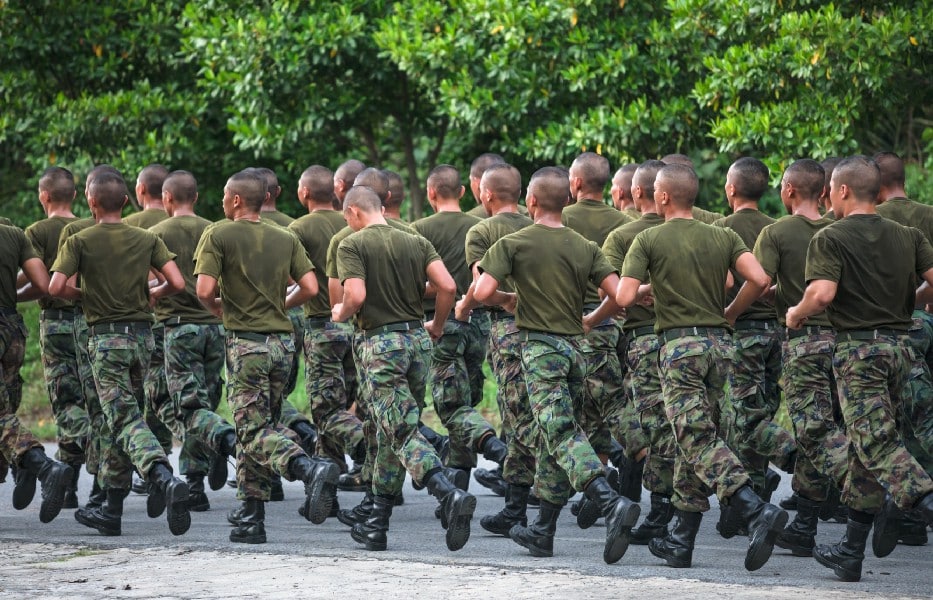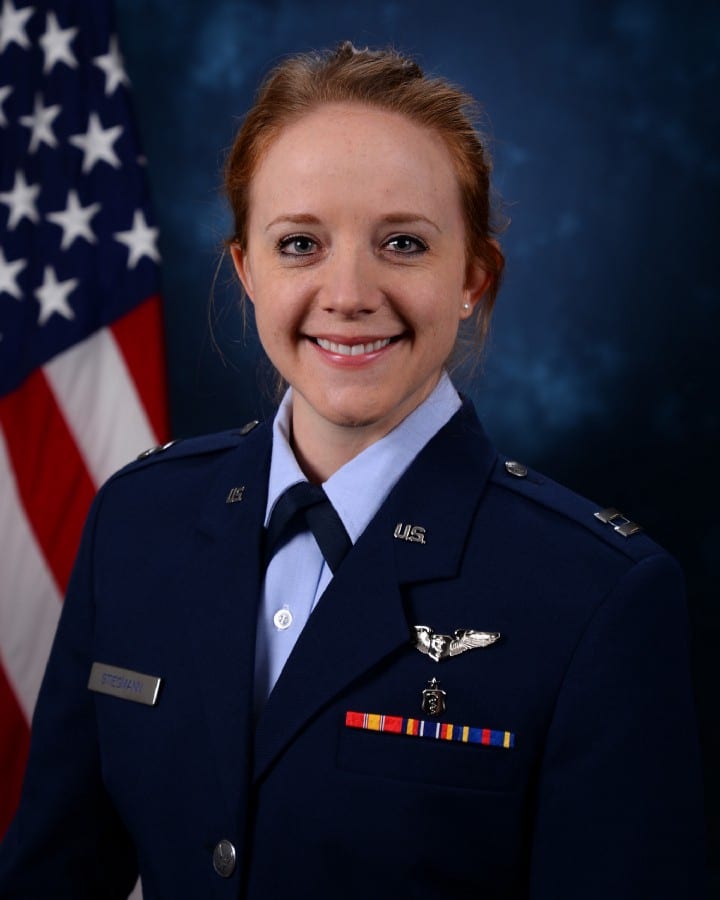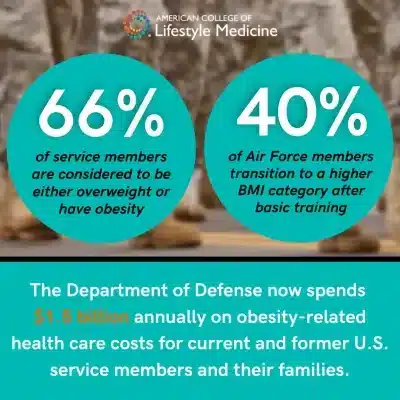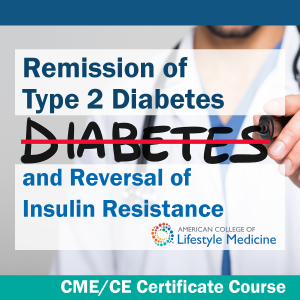There is a Growing Threat to Our National Security
The growing burden of non-communicable chronic disease in the military has been called a threat to U.S national security. The Air Force is incorporating lifestyle medicine into its health systems to improve readiness and to optimize warfighter capabilities.
“Research absolutely reinforces that the tenants of lifestyle medicine augment the war fighter capabilities of our service members.” – Air Force Maj. Regan A. Stiegmann, DO

A quiet threat to United States national security is infiltrating the health and wellness of the brave men and women who serve.
The growing epidemic of chronic disease in the U.S. has not spared the armed forces, where almost 66 percent of service members are considered to be either overweight or have obesity. After basic training, nearly 40% of Air Force members transition to a higher body mass index category, while just 4% fall into a lower weight category. The Department of Defense now spends $1.5 billion annually on obesity-related health care costs for current and former U.S. service members and their families.
COVID-19 highlighted even further the risks posed by these health trends. An Army report found service members who required hospitalization after infection were more likely to be overweight, have obesity or suffer from another chronic condition like hypertension, than peers who did not require hospitalization, said Colonel Valerie Castle, DO, MPH, of the 49th Medical Group at Holloman Air Force Base in New Mexico, during an ACLM Health Systems Symposium on the application of lifestyle medicine within the military.
“These are national security issues,” said Dr. Richard Carmona, the 17th Surgeon General of the United States, who served during the second Persian Gulf War, in November. “It takes away from the readiness of the troops.”
The search for a solution to this escalating chronic disease burden has led to the integration of the rapidly-growing field of lifestyle medicine to help create a new culture of health for active duty service members, veterans, and their families. The Air Force is leading the way, infusing the pillars of lifestyle medicine into military treatment facilities and creating a foundational model for other military branches to emulate. The Department of Veterans’ Affairs is incorporating elements of lifestyle medicine into its Whole Health Initiative, a cutting-edge approach to care that supports health and wellbeing using a holistic approach.
Lifestyle medicine is defined by the American College of Lifestyle Medicine (ACLM) as the use of evidence-based lifestyle therapeutic intervention — including a whole-food, plant-predominant eating pattern, regular physical activity, restorative sleep, stress management, avoidance of risky substances, and positive social connection — as a primary modality, delivered by clinicians trained and certified in this specialty, to prevent, treat, and often reverse chronic disease.
The military is not alone in its interest in lifestyle medicine. As health care costs swell and disease management strategies that prioritize medications and procedures have proven ineffective, more clinicians are exploring different strategies for delivering care. ACLM, the organization that educates, equips and supports certification of physicians and other clinicians in lifestyle medicine, has grown from 500 members in 2014 to more than 7,000 in 2022.
Health systems are a rapidly growing segment of ACLM’s members and partners, including participants in the newly formed Health Systems Council, an assembly of more than 40 health systems across the nation that are actively integrating a therapeutic dose of lifestyle medicine into patient care, employee health, and their broader communities. But none have a mission quite like the military, which provides health services to more than 9.6 million active duty personnel, military retirees and their families, and is responsible for ensuring active duty and reserve/guard personnel are healthy to complete their missions.
The Defense Health Agency J-7 Continuing Education Program Office (CEPO) has already created a certified continuing medical education program focused on lifestyle and performance medicine for health care professionals. The course is approved for maintenance of certification by the American Board of Lifestyle Medicine and International Board of Lifestyle Medicine.

“Research absolutely reinforces that the tenants of lifestyle medicine augment the war fighter capabilities of our service members,” said Air Force Maj. Regan A. Stiegmann, DO, a flight surgeon and preventive medicine physician, during the recent ACLM Health Systems Symposium. “We can stay in the fight stronger — and for longer. We can remain not just deployment-ready, but deployment-primed to perform.”
Healthy lifestyle boosts performance
Although they are healthier upon entering military service compared to the general population, veterans in the long-term tend to be of equivalent or worse health than civilians, according to a 2017 report in the Journal of Behavioral Medicine.
“One primary explanation for the veterans’ health disparity is poorer health behaviors during or after military service, especially areas of physical activity, nutrition, tobacco and alcohol,” the report stated.
In fall 2019, a group of medics aware that chronic disease was impacting readiness among Airmen brainstormed how to infuse lifestyle medicine across the Air Force Medical Service (AFMS). Drawing on a team of like-minded physicians from different backgrounds, they drafted an official charter to serve as a guiding document and began earning buy-in from Air Force senior leadership.
Up the chain they went, first to a one-star general responsible for ensuring medical readiness, followed by a two-star general who oversaw military health benefits. Both generals endorsed the charter and supported the creation of an interdisciplinary working group of Air Force physicians, dietitians, health psychologists, nurses, enlisted medical technicians, and physical therapists.
Aware of the need to gain the attention of Air Force leaders at the highest level, members strategically named the team the Lifestyle & Performance Medicine Working Group.
The working group added “performance” into the title of the group so leaders would immediately make the connection between health and war-fighting capabilities, said Colonel Valerie Castle, DO, MPH, of the 49th Medical Group at Holloman Air Force Base in New Mexico, during the ACLM symposium.
As result, the foundation of lifestyle medicine is starting to permeate care delivery throughout military treatment facilities, as patients and providers alike are appreciating its profound impact on health. In practice, this is a significant departure from the traditional way of treating patients, according to Colonel Mary Anne Kiel, MD, FAAP, DipABLM, Medical Home Chief with the Air Force Readiness Agency, in a summer 2021 Air Force Medical Services news story. Lifestyle medicine takes a holistic approach and addresses the patient’s personal health goals by identifying what is most important to the patient and developing a treatment plan involving the foundations of lifestyle medicine, she said.
It is important that clinicians are on the same page when it comes to treatment plans, she said in the story. A focus on lifestyle health behavior — not temporary pharmaceutical solutions or unnecessary and costly medical procedures common in modern medicine — should be the foundation of care delivery.
“It is different from what we have done in the past where the primary care provider will see the patient, recommend the patient see a specialist who may not have any training in lifestyle medicine, and both provide a treatment plan” that does not incorporate lifestyle health changes, Col. Kiel was quoted as saying. “That patient may then see another health care professional who may also prescribe another treatment plan. We want all health care professionals speaking the same language about the treatment plan through lifestyle medicine.”
Benefits of lifestyle medicine interventions are already evident. Maj. Grant Scholl, the 70th Flying Training Squadron Operations Manager, received a consultation from Maj. Stiegmann because he was struggling with high cholesterol and pre-diabetes as a pilot in his mid-30s.
Under her treatment plan, he significantly reduced his LDL cholesterol, lost weight, reversed his pre-diabetes, improved his energy levels and optimized his sleep hygiene.
“I had always prided myself in eating right, working out and being all-around healthy, but seeing my labs and pre-diabetic indicators really shocked my conceptions of where I believed my health to be,” Maj. Scholl said in the story. “After we made a few minor changes to the way I eat, in three months I was able to reset all of my health metrics well into the normal health investment zone range.”
‘We must be ready’
Momentum for the integration of lifestyle medicine in the military is growing. The Air Force Lifestyle Medicine & Performance Working Group has shared its story and goals with the most senior Air Force enlisted leaders and advised senior leaders of the developing United States Space Force on best health practices. It also has advised the Air Force Personnel Policy Division about modernization of the Air Force fitness assessment.
“In the last two years, the Lifestyle and Performance Medicine Working Group has blossomed from a spout of great ideas into a strong and mighty force,” Col Castle said during ACLM’s 2021 symposium.

A 2020 Defense Health Board report on the Modernization of Tricare Benefits recommended that the Department of Defense include Intensive Lifestyle Disease Reversal (ILDR) programs among those covered by TRICARE, the health care insurance program that provides health benefits for U.S Armed Forces military personnel, military retirees and their dependents. The report noted that ILDR is backed up by three decades of research evidence that supports the intensive use of health behaviors to treat and reverse common diseases.
“Optimal lifestyle habits are the most important contributor to better health, defined at the simplest level for the TRICARE beneficiary as to how well and how long one lives,” the report stated. “The (Department of Defense) should judge vendors and innovations in this area on their ability to engage beneficiaries in successfully understanding and improving healthy behaviors.”
The military has a vested interest in preventing lifestyle-related chronic disease among civilians. Currently, 71% of young people in the U.S. could not join the military if they wanted to, and obesity disqualifies 31% of youth from serving if they chose to, according to November 2021 report by the U.S. Centers of Disease Control and Prevention (CDC).
Those who are commissioned but have less physical fitness at baseline are more likely to get injured during basic training. From 2008 to 2017, service members had more than 3.6 million musculoskeletal injuries, the CDC found. One study found that service members with obesity were 33% more likely to get this type of injury.
“The rates of rampantly escalating chronic disease in the United States look nearly the same whether you’re in a military uniform or in civilian clothes,” Maj. Stiegmann said during the ACLM symposium “This statement should give you profound pause. This failure of health maintenance within our service member population is a direct threat to our national security.”
Would you like to get more involved?
Join the VA/DOD Member Interest Group! Participation in one or more ACLM member interest groups (MIG’s) is a great way to suppport your lifestyle medicine journey.
The intention of the VA/DOD member interest group is to unite DoD/VA thought leaders who are interested in building, bridging, and expanding Lifestyle Medicine efforts world-wide through collaboration.









